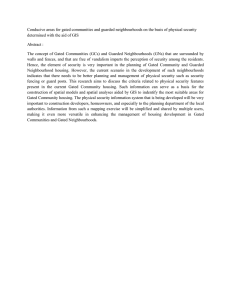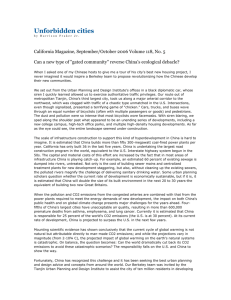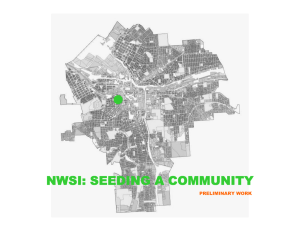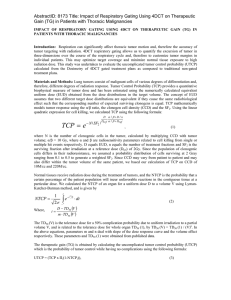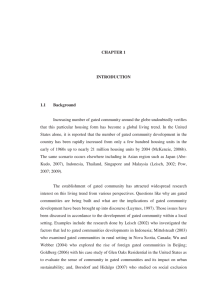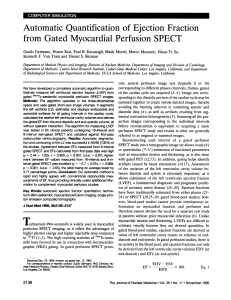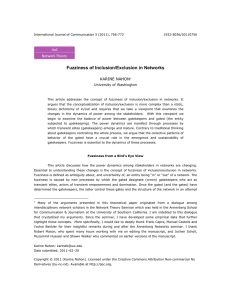The Secure City
advertisement
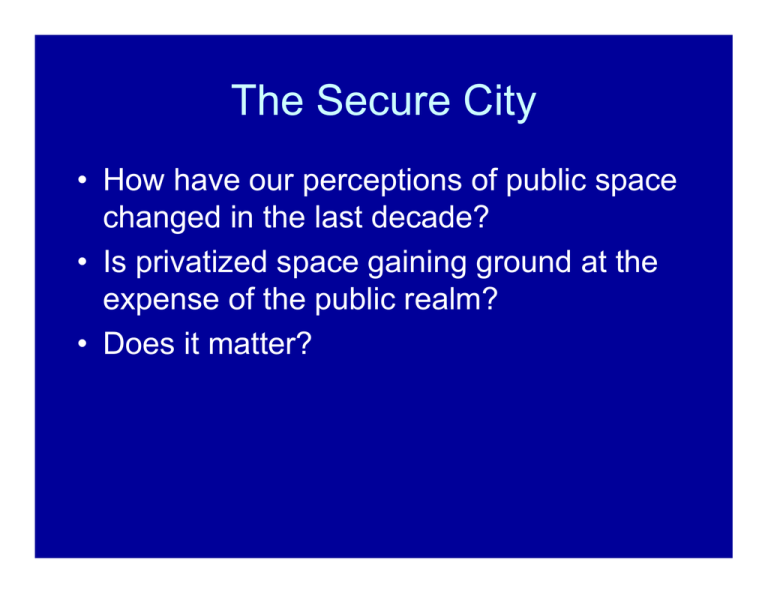
The Secure City • How have our perceptions of public space changed in the last decade? • Is privatized space gaining ground at the expense of the public realm? • Does it matter? The Secure City • The Fortress City • Gated Communities • “Secure” Urban Public Spaces The Fortress City Gated Communities More than 7 million households — about 6% of the national total — are in developments behind walls and fences. About 4 million of that total are in communities where access is controlled by gates, entry codes, key cards or security guards. Homeowners in gated communities live in upscale and mostly white developments. But renters, who are more ethnically diverse and less affluent, are nearly 2-1/2 times as likely as homeowners to live behind gates or walls. Whether they own or rent, Hispanics are more likely to live in such communities than whites or blacks. That may be partly because there is a large Hispanic population in the West and Southwest, areas with the largest concentration of gated communities. Gated Communities Affluent African-American homeowners are less likely to live in gated communities than whites and Hispanics, even in metro areas such as Atlanta and Washington, D.C., which have a large black middle class. Experts theorize that after centuries of exclusion, blacks may be reluctant to embrace such a lifestyle or to live in predominantly white developments. Source: Analysis of the Census Bureau's 2001 American Housing Survey, a sampling of 62,000 households that is representative of the nation's 119 million households, Virginia Tech Metropolitan Institute Paradise Village, Nuevo Vallarta, Mexico Amenities: • 24-hour security, roving patrols and security checkpoints • 18 hole, championship El Tigre golf course, par 72, 7,239 yards, designed by Von Hagge, Smelek and Baril • Practice facilities, Pro Shop • 45,000 sq. ft. Clubhouse with restaurant, bar, spa and more • and so on… Secure Urban Public Space • • • • Defensible space CCTV Surveillance Adhoc security measures National Capital Urban Design and Security Plan (10/02) • “Secure” landscape design and urban design Defensible Space The Institute for Community Design Analysis The Institute for Community Design Analysis, Inc. is a notfor-profit corporation which, for the past 25 years, has developed and applied a technology that uses the physical restructuring of housing projects and residential communities to reduce crime and improve stability. The basis of this restructuring is the subdivision of previously public areas of projects and streets and their re-assignment to the control of neighboring residents. This reassignment includes both exterior areas (grounds, streets, parking lots, play areas) and the interiors of multi-family buildings (lobbies, stairs, corridors, elevators, laundry rooms, etc.). This technology is called "Defensible Space" and has proven to have long-term effectiveness at low cost. Adhoc Security Measures "Americans will overreact to the destruction of the twin towers by barricading public spaces that form centers of community and symbolize American openness and optimism.“ - Chicago Tribune architecture critic Blair Kamin How to visit Since September 2001, the interior of the building, including the 60th floor observatory, has been closed to the public. National Capital Urban Design and Security Plan The Plan was motivated by: providing appropriate levels of perimeter security; providing a seamless system of components that enhance the public realm and provide security; expanding the palette of elements that can provide perimeter security; and giving priority to achieving aesthetic continuity along streets. The Plan includes: A summary of the building perimeter security considerations that influence the conceptual streetscape designs proposed in the Plan. Streetscape design concepts that incorporate security components. These conceptual designs illustrate how an array of landscape treatments and street furniture may be applied within various areas of the Plan and are not intended as final designs. A proposal to initiate the Circulator transportation system; develop a comprehensive parking program, including possible secure, centralized facilities; and undertake a set of comprehensive traffic and parking studies to evaluate impacts and develop strategies for mitigating and improving the overall condition. An implementation strategy for design, construction, funding, maintenance, and operations. The implementation program will ensure that work is completed according to the design intent and that improvements are maintained. Secure Landscape Design and Urban Design …legitimate questions need to be addressed about the nature of the security response and the process for determining it. The manner in which this nation approaches its security has tremendous implications for how our nation functions and how our people perceive their society and their place in it for years to come. Done well, security will protect us all and all that we hold dear, while making clear that this nation continues to rest on a close relationship between its people and its government. Done poorly, security will make us fearful and literally erect barriers to how people interact with the government it has established. Design professions, preservationists, communities, and security professionals need to work together to develop solutions that achieve this balance. ASLA Security Design Coalition


